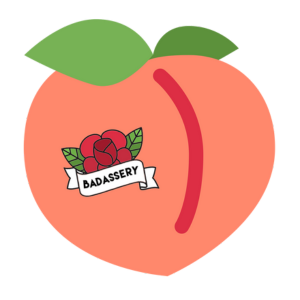I Don’t Have a Tidy Immigrant Story, and That’s Ok
By Badassery member Paige Curtis (she/her), Product Manager at Upstream Tech, a daydreamer, process optimization tsar, foodie, proud taurus and pop-culture junkie.
Many years ago, while dissecting the family drama du jour with my mother on the phone, I realized how little I had known about one relative in particular. My maternal grandmother, Enid, was orphaned, and her early life remains a mystery of sorts. This was a topic at every major family gathering over the years, and as myself and my gaggle of cousins grew older, we demanded answers that our parents simply didn’t have. Like many of us, I dabbled in a slew of quarantine hobbies. For me, it was gardening in the summer, bread-baking in the fall, and trampoline fitness in the winter. Learning more about Enid’s life became my next obsession, and with more time on my hands during quarantine, I wanted to finally discover the truth.
My maternal grandmother Enid, photographed in 1989 holding my cousin.
My grandmother was born Enid May (or ‘Mae’) in Askinish, a village in Hanover, Jamaica. Her mother died shortly after giving birth. Months later, a devastating hurricane flooded Enid’s parish, destroying any provincial records from that period. With no official documents to corroborate her early years, her story persists in the minds of relatives who guard a piece of her life closely. My Aunt Lorna recalls that Grandma Enid was taken in by relatives, John and Martena Harvey, in a town called Harvey River. The founding families of post-Emancipation Jamaica established themselves wherever they could find land, and many of those early settlements bear their names. The Harvey family - descends of a White Englishman, William Harvey - were known for their mixed race features. My mother remembers Grandma Enid’s freckles and a reddish tint to her hair, not unlike the Harveys.
My grandmother’s story comes into finer focus as she grew older and had children herself. Unwed women, ‘spinsters,’ were largely disenfranchised in the Christian-dominant culture of this era, so she married early and remained partnered for most of her life. Married life afforded her a legitimacy she didn’t have at birth, managing a household and raising six children. She took on the last name “Perkiss'' at one point, but died as Enid Grey in 1989. My family made tentative plans to travel down to Jamaica this year, hoping to do more research in person. Then, COVID happened.
With long stretches of free time during quarantine, I created an Ancestry.com account on a whim. Days later, I was hooked to my computer and pinning notes to a corkboard, desperate to solve the case. Each new lead I found kept me searching for more; I couldn’t stop. One relative vaguely remembered someone named ‘Anita,’ and thought she might be Enid’s mother. Others had reason to believe someone named ‘Freddie Mae’ was the father. I hunted for birth certificates, marriage and death records, but the few I found didn’t align with the timeline of her life. Exhausted, I reached out to Lorna Goodison, an acclaimed Jamaican poet turned academic and descendent of the original Harvey family, hoping she might know more. She was able to corroborate the details I shared, but little more.
My maternal grandfather Byron in his younger years. Him and my grandmother were never married.
I never found her biological parents, and pieces of her story become more scattered with passing time and migration. As a first-gen child of immigrants I’m likely to spend most of my life trying to know my people. My proximity to their culture will wax and wane, but mostly my knowledge of them, and myself by extension, will feel incomplete. These mysteries, secrets, and the like can be vexing to a family yearning to be “respectable.” It complicates any sense of a tidy family tree with a central narrative.
But they also remind us that the information we lack does not devalue the knowledge we have. Not knowing Enid’s origin story does not diminish what I know of the life that came after.
I would never find Grandma Enid’s name attached to a provincial business license, but she was an astute shopkeeper for most of her life, known to calculate large sums in her head. I found no reference to her in The Daily Gleaner, the preeminent newspaper of Jamaica, but know that she was generous and well-regarded in her community. She had little formal schooling, and all of her children remember her as shrewd and forthright—the decisive matriarch of our family to this day. Her children began new lives in parishes and countries far away. There were visas to file, children to raise, and a stream of marriages, disagreements, celebrations and sorrows. It became increasingly difficult to remember where we left that box of her trinkets or who’s turn it was to place flowers on her grave. Yet, I’ve come to view her fragmented, imperfect story as a shattered mirror: achingly beautiful in that each piece shines, and reflects something different.
Check out more about Paige on her Badassery page and follow her on LinkedIn.


